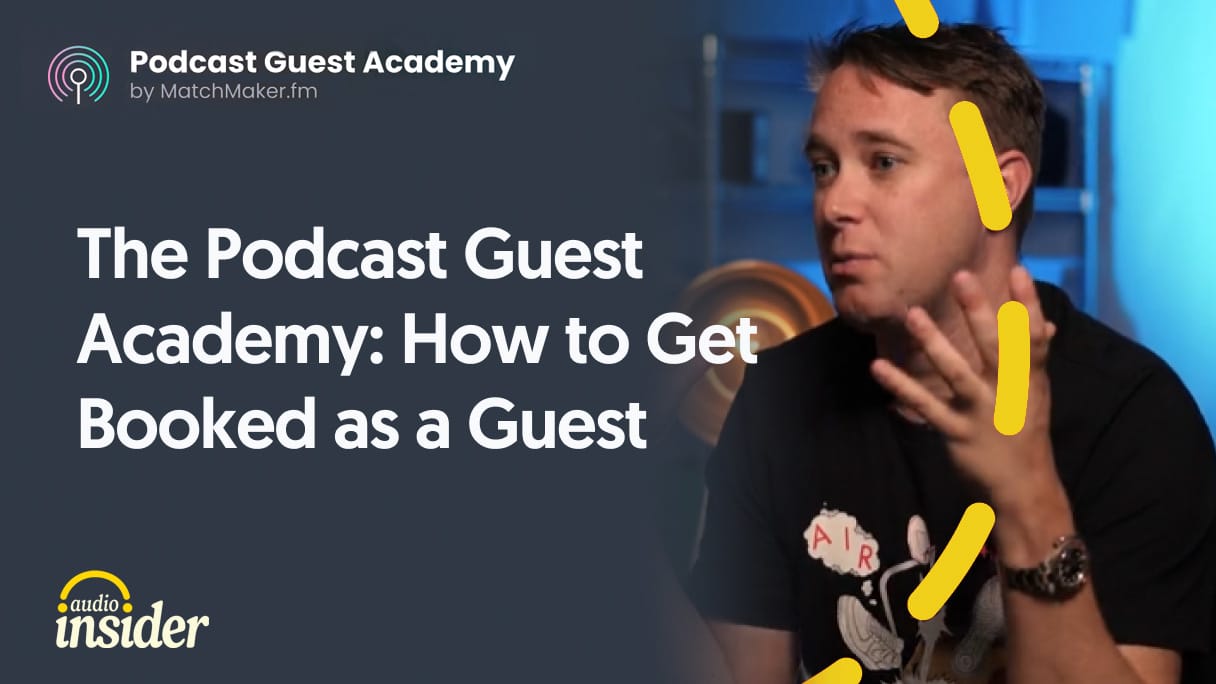Picture this: you’re a podcast host. You check your inbox and see a pitch with the subject line “Guest for your podcast.” Riveting. You open it, and it starts with, “Hello, I love YOUR podcast!” followed by a bio so generic it could have been written for a cooking show, a tech podcast, or possibly your grandma’s book club. No mention of your show. No reason they’re a fit. You know exactly where it’s going — straight to the trash, faster than you can hit “mark as spam.”
And yet, people send these types of pitches every single. single. day.
If you want to be a podcast guest, you need to do better. Much better. This guide will show you how to pitch yourself to podcasts in a way that gets you booked and makes the host excited to have you on.

Why podcast interviews are valuable opportunities
Before we get to how to pitch yourself successfully, let’s cover why being a podcast guest can be an excellent idea for you and your personal (or professional) brand.
Access to a targeted audience
One of the biggest perks of being a podcast guest is skipping the small talk and landing right in front of people who already care about what you have to say. A well-matched podcast audience is pre-qualified — they’ve hit play because they’re interested in the topic, the host, or the type of stories being shared.
Instead of shouting into the social media void, hoping the right people hear you, you get a direct line to listeners who are far more likely to stick around, follow your work, and even buy from you. It’s like walking into a room where everyone’s already nodding along before you’ve said a word.
Long-form storytelling
Podcasts give you something most platforms don’t: time. You’re not cramming your entire life story, expertise, and personality into a 60-second reel or a tweet that gets buried in five minutes. Instead, you get space to dig in, explain your ideas, and share the kind of stories that make people feel like they know you.
In fact, according to research, most podcast listeners aren’t just tuning in casually — they stick around for the entire episode. On average, people spend 30–60 minutes per session listening to podcasts, and more than 70% of listeners finish most or all of each episode.
This isn’t just better for connection, it’s better for trust. Listeners can hear your tone, your enthusiasm, and your personality in a way text alone can’t deliver. And when people trust you, they’re much more likely to follow you, buy from you, or bring you into new opportunities.
Evergreen content
A social media post might get attention for a day. A podcast interview can keep introducing you to new people for months or even years. Most shows keep their complete archives available, which means someone could discover your episode long after it was recorded and still hear your story exactly as you told it.
The same episode can bring in waves of new listeners over time, especially if it gets shared or recommended. It is content that keeps working in the background without you having to create anything new. Each interview you do becomes another permanent touchpoint that can build your audience and open new opportunities well into the future.
Relationship building
A good interview can turn into a genuine professional relationship that opens doors you didn’t even know were there. Hosts often have strong networks in your industry and can introduce you to future collaborators, clients, or media opportunities.
Even one appearance can lead to multiple touch points, like invitations to other podcasts, guest articles, panel spots, or joint projects. And because the conversation happens in a relaxed, one-on-one setting, the rapport you build feels natural, not transactional.
The takeaway? Treat every interview as the start of a relationship, not a one-off marketing move.
SEO and discoverability
Podcast interviews do not just reach the people who hit play. They can also help new people find you through search. Many shows publish episode pages with your bio, links, and keywords that Google can index. This means someone searching for a topic you covered could discover you months later without ever having heard of the podcast before.
Those pages often include backlinks to your website or social profiles, which can boost your search rankings. It is a bonus layer of visibility that works in the background, adding even more reach to every guest appearance you make.

How to research and select the right podcasts to pitch
Now that we’ve convinced you about the power of being a guest on a podcast, it’s time to find the right podcasts to pitch. But first, remember that it's not about chasing the biggest names. It is about finding the shows whose audience matches the people you most want to reach.
1. Identify your target audience
Your target audience is the people you want to listen to your message. When you pitch yourself to a podcast, you want that show’s audience to line up with yours. If they do not, the interview will land with the wrong crowd. That is why you need to know the basics about your audience before you send a single pitch. Who are they? How old are they? Where do they live? What do they care about? What problems are they trying to solve? Once you have those answers, you can focus on podcasts that already have those listeners tuning in.
For example, if you help first-time homebuyers, you would not pitch yourself to a podcast about luxury real estate. You would look for shows aimed at young adults, budgeting, or getting on the property ladder — the spaces where your ideal listeners are already paying attention.
2. Search strategically
Do not waste time sending pitches to every podcast you can find. Start with shows that serve the audience you want to reach. Use podcast directories, Apple and Spotify search, or even Google to find episodes on your topic. Look at where your peers or competitors have been interviewed — if they were a fit, you might be too.
You can also use tools like Matchmaker.fm to connect directly with hosts looking for guests. It lets you search by topic, audience type, and show size, so you spend less time guessing and more time finding podcasts that make sense for you.
Keep a running list of potential podcasts, noting the host’s name, the format, and any angles that could make your pitch stand out later.
3. Evaluate audience size and engagement
Bigger is not always better. A smaller podcast with a highly involved audience can be far more valuable than a huge show where most listeners tune out after five minutes.
You will not always get exact download numbers, but you can look for clues. Check their social media for likes, comments, and shares. See if listeners leave reviews or interact with the host online. If the audience is talking about episodes, asking questions, and sharing takeaways, that is a sign they are paying attention, and that your message has a better chance of sticking.
4. Vet the podcast
Finally, before you pitch, make sure the podcast is a good fit. Listen to at least one full episode and skim a few others. Pay attention to the tone, format, and topics they cover. Would your story or expertise feel natural in that mix, or would it stick out in a bad way?
Check who they have interviewed before. If they feature guests with a similar background to yours, that is a good sign. If every guest is a celebrity or industry giant and you are just starting, it may be harder to land a spot. Look at their release schedule too — a show that has not been published in six months is not worth your time.

Crafting a compelling and personalized podcast pitch
You’ve found the perfect podcast. Now what? Most pitches are generic, self-focused, and easy to ignore. A good pitch grabs the host’s attention, makes it clear you are a fit for their audience, and shows that you have done your homework. If you want yours to stand out in a crowded inbox, you need to make it personal, relevant, and impossible to dismiss. Here is how:
Lead with relevance
Show the host you know their show. Start your pitch by referencing a specific episode, guest, or topic that connects to your expertise. This proves you are not sending the same copy-and-paste email to everyone and immediately signals you are a real fan.
Instead of “I love your podcast,” try “I enjoyed your recent episode on remote team culture with Alex Smith. I’d love to build on that conversation by sharing how I helped a 50-person startup transition to fully remote in under a month.” Specifics make you memorable.
Highlight the value for their listeners
Hosts care most about serving their audience, so make your pitch about what listeners will gain, not what you want to promote. Show how your story or expertise fits their audience’s needs and why it will be worth their time. Keep the focus on outcomes for the listener rather than benefits for yourself.
Include a precise and unique angle
Make it obvious why you are different from other potential guests. Focus on what you can share that they have not already covered, whether it is a fresh perspective, a specific case study, or a timely topic.
Show that you know your stuff
Once you have given the host a unique perspective, explain why you are the right person to talk about it. Share your relevant credentials or experience, whether you wrote a book, work professionally in the field, or have real-world results to back it up.
Include links to your website, social media, or other resources so they can quickly learn more about you. If you have been interviewed before, link to a previous podcast appearance or video so they can hear your style and see that you know how to deliver value as a guest.
Keep it brief and easy to scan
Hosts and producers get dozens of pitches every week, so make yours easy to read. Use short paragraphs, clear headings, or bullet points to highlight your main points. Avoid long blocks of text and unnecessary details that dilute your message. The goal is for them to understand who you are and why you are a fit in under a minute.
Don’t forget an eye-catching subject line
And last but certainly not least, your subject line is the first thing a host sees, so make it count. Avoid vague lines like “Podcast guest inquiry” and go for something that sparks curiosity or highlights the value you bring.
Keep it short, specific, and relevant to their audience so they have a reason to open your email right away. Want an example? Instead of “Interview request,” try “How I doubled a remote team’s productivity in 30 days” or “From zero to 100K listeners: Lessons your audience will love.”
Common mistakes to avoid when pitching to podcasts
Now that you know how to craft a compelling pitch, here are a few pitfalls that can tank your chances, and why they matter.
- Pitching a show you have never listened to — it is obvious when you have no idea who the host is or how they run their interviews.
- Failing to research the show and pitching a topic they have already covered — this wastes both your time and theirs.
- Talking only about yourself — your pitch should connect your story to what the audience will gain.
- Pitching at the wrong time — sending a pitch right after the show has wrapped a season or during a known break means it might get lost or ignored.
- Overloading with irrelevant achievements — keep your bio focused on what makes you the right fit for that specific show.
- Using a clickbait subject line — if it feels spammy, it will go straight to the trash.
- Forgetting to make a clear ask — a host should not have to guess whether you want to be interviewed or collaborate in some other way.
- Skipping the proof — no links, clips, or past interviews means the host has no idea if you can deliver.
- Following up too often or too aggressively — this can turn a “maybe later” into a hard no.
And if you have done the work to make your pitch strong, the last thing you want is to ruin it with a clumsy or overbearing follow-up. So let’s address that next.

Following up and building relationships with podcast hosts
You have sent your perfect pitch and then — silence. A day goes by. A week. No word. Now what? The key is to follow up in a way that reminds the host of your value without making you sound desperate or pushy.
Wait at least a week before sending a short, polite follow-up. Keep it simple: reference your original pitch, restate the value you can bring, and ask if they had a chance to consider it. Avoid sending multiple follow-ups in quick succession. Two attempts total are usually enough. If you still do not hear back, move on and focus your energy on other opportunities.
Sometimes, no response is simply a “not right now,” so leaving the door open for future collaboration keeps you on good terms.
🎙️Podcasting tip: Use an email tracking tool like Mailtracker to see if your pitch was opened or if any links were clicked. If it was never opened, it might have landed in the host’s spam or promotions folder, which means a polite follow-up could be your first real chance to get seen.

Take your pitching further with Podcast Guest Academy
Finally, if you found these tips helpful and you’re serious about becoming a sought-after podcast guest, the next step is building a repeatable system for pitching yourself with confidence. That’s exactly what the Podcast Guest Academy, a course taught by our founder James Mulvany, is designed to help you do.
Inside the program, you’ll learn how to:
- Craft pitches that stand out in crowded inboxes
- Position yourself as the guest every host wants to book
- Develop clear, engaging talking points that showcase your expertise
- Turn each interview into long-term relationships and opportunities
Instead of guessing what works, you have a step-by-step framework and insider strategies that shorten the learning curve and get you booked faster.

Benefits of using MatchMaker as a tool to find podcasts
After all the effort you put into crafting the perfect pitch, you want to send it to the right people. That is where MatchMaker comes in. It connects you directly with podcast hosts who are actively looking for guests, saving you the hours of searching and cold outreach.
You can filter by topic, audience, and format, making it easier to match your expertise with the right listeners. Instead of emailing dozens of random shows, you start the conversation with hosts already open to collaboration, which means your chances of landing that interview go way up.
In the end, the right tools can make pitching less of a numbers game and more of a targeted, strategic process, and that is when you start seeing real results.






